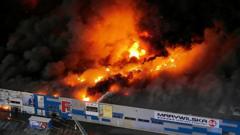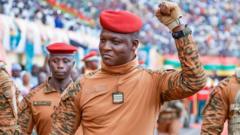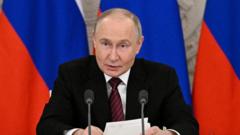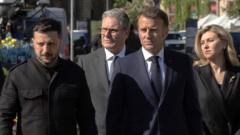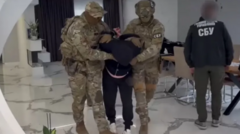Zelensky's call for a truce highlights ongoing tensions as Western nations push for dialogue and impose new sanctions.
Zelensky Urges Immediate Cease-Fire Ahead of Proposed Talks with Putin

Zelensky Urges Immediate Cease-Fire Ahead of Proposed Talks with Putin
Ukrainian President's Demand Comes Amid Sanctions Threat from European Leaders
President Volodymyr Zelensky of Ukraine approached Russia’s recent proposal for direct discussions with caution, labeling it a "positive sign" while insisting on an immediate cease-fire. This marked a significant statement by Zelensky just hours after President Vladimir Putin of Russia dismissed calls for a truce.
In a social media update, Zelensky expressed hope for a confirmation from Russia regarding a cease-fire starting Monday, although he noticeably avoided addressing Putin’s invitation to meet in Istanbul on May 15. The exchange between the two leaders also came in response to a visit from the leaders of France, Germany, Britain, and Poland to Kyiv, after which a deadline was set for Russia to agree to a 30-day cease-fire. Failure to comply could lead to additional sanctions from Europe and the United States.
The U.S. administration has taken a stance of alignment with Russia at the United Nations regarding the ongoing conflict yet has not escalated the sanctions further, despite ongoing military operations by Russian forces. In contrast, Ukraine had previously accepted a U.S. suggestion for an unconditional cease-fire back in March.
During a late-night press conference, President Putin highlighted his interest in initiating discussions with Ukraine imminently in Istanbul. However, he did not commit to the cease-fire plan and reiterated that Russia would only consider such proposals if Western military supplies to Ukraine ceased.
The tension continues to rise as both sides prepare for possible negotiations, and the international community remains watchful of how these dynamics will evolve in the coming days.
In a social media update, Zelensky expressed hope for a confirmation from Russia regarding a cease-fire starting Monday, although he noticeably avoided addressing Putin’s invitation to meet in Istanbul on May 15. The exchange between the two leaders also came in response to a visit from the leaders of France, Germany, Britain, and Poland to Kyiv, after which a deadline was set for Russia to agree to a 30-day cease-fire. Failure to comply could lead to additional sanctions from Europe and the United States.
The U.S. administration has taken a stance of alignment with Russia at the United Nations regarding the ongoing conflict yet has not escalated the sanctions further, despite ongoing military operations by Russian forces. In contrast, Ukraine had previously accepted a U.S. suggestion for an unconditional cease-fire back in March.
During a late-night press conference, President Putin highlighted his interest in initiating discussions with Ukraine imminently in Istanbul. However, he did not commit to the cease-fire plan and reiterated that Russia would only consider such proposals if Western military supplies to Ukraine ceased.
The tension continues to rise as both sides prepare for possible negotiations, and the international community remains watchful of how these dynamics will evolve in the coming days.

